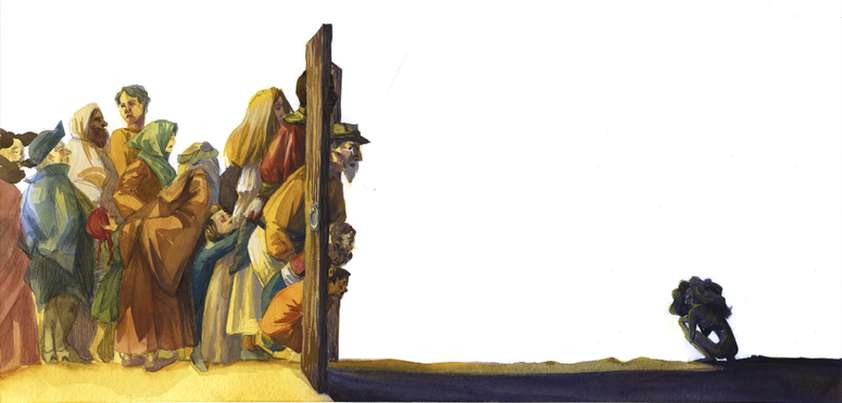 This 1950s story from Langston Hughes has messages for both young and old. A teenage thief (Roger) learns that in addition to it being wrong to try to get things “the easy way”, sometimes the person you target is a kindly soul who can ill afford it. Mrs Jones knows what it is like to grow up poor. Instead of handing Roger over to the police, she tries to help him. Sadly, one suspects that her actions (taking the lad home for a meal and friendly chat) would not be safe in today’s world. Themes: crime, forgiveness, understanding, trust, kindness. More…
This 1950s story from Langston Hughes has messages for both young and old. A teenage thief (Roger) learns that in addition to it being wrong to try to get things “the easy way”, sometimes the person you target is a kindly soul who can ill afford it. Mrs Jones knows what it is like to grow up poor. Instead of handing Roger over to the police, she tries to help him. Sadly, one suspects that her actions (taking the lad home for a meal and friendly chat) would not be safe in today’s world. Themes: crime, forgiveness, understanding, trust, kindness. More…
Resurrection of a Life
 In this story by William Saroyan, a man reflects on his life as a ten-year-old paperboy in 1917. As many of his memories appear infused with wisdom that usually comes with age, it is difficult to distinguish between his true boyhood thoughts and adult-inspired interpretations. One area where the difference is clear is religion. As a boy, he found it difficult to accept God due to the carnage of World War 1 and other injustices in his world. As an adult, he believes there is no death, and can never be. Themes: poverty, morality, facing and accepting reality, belonging, religion. More…
In this story by William Saroyan, a man reflects on his life as a ten-year-old paperboy in 1917. As many of his memories appear infused with wisdom that usually comes with age, it is difficult to distinguish between his true boyhood thoughts and adult-inspired interpretations. One area where the difference is clear is religion. As a boy, he found it difficult to accept God due to the carnage of World War 1 and other injustices in his world. As an adult, he believes there is no death, and can never be. Themes: poverty, morality, facing and accepting reality, belonging, religion. More…
Minutes of Glory
 This Ngugi Wa Thiong’o story highlights the human cost of progress in developing countries such as post-independence Kenya. Its main themes are exploitation, class differences, identity, loneliness and appearances. A young woman leaves her village in search of a better life in the city. She is poorly educated, and ends up working as a hostess in beer bars. Unhappy with the life, the money she makes and her appearance, she dreams of something better. Cut off from her family and alone in the world, she steals money from a customer and uses it to experience a few minutes of glory. More…
This Ngugi Wa Thiong’o story highlights the human cost of progress in developing countries such as post-independence Kenya. Its main themes are exploitation, class differences, identity, loneliness and appearances. A young woman leaves her village in search of a better life in the city. She is poorly educated, and ends up working as a hostess in beer bars. Unhappy with the life, the money she makes and her appearance, she dreams of something better. Cut off from her family and alone in the world, she steals money from a customer and uses it to experience a few minutes of glory. More…
The Ones Who Walk Away From Omelas
 This philosophical narrative by Ursula Le Guin describes life in the seemingly utopian city of Omelas. We learn that almost everyone in the city lives in complete happiness. There is no organized system of rule, few laws, sexual freedom, no crime, no violence, and nobody living in want. Sadly, there is a blight on this “paradise”. For happiness to prevail, a single child must live in absolute misery, locked up alone in an underground cell. Themes: morality and moral compromise (the price of happiness), victimization, complicity (collective knowledge = shared responsibility), guilt, courage (the ones who “walk away”). More…
This philosophical narrative by Ursula Le Guin describes life in the seemingly utopian city of Omelas. We learn that almost everyone in the city lives in complete happiness. There is no organized system of rule, few laws, sexual freedom, no crime, no violence, and nobody living in want. Sadly, there is a blight on this “paradise”. For happiness to prevail, a single child must live in absolute misery, locked up alone in an underground cell. Themes: morality and moral compromise (the price of happiness), victimization, complicity (collective knowledge = shared responsibility), guilt, courage (the ones who “walk away”). More…
Marigolds
 In Eugenia Collier’s Marigolds the protagonist comes of age (or in her words loses her innocence) when caught in a senseless act of destruction. Angry about her father’s shame over not being able to find work, she lashes out at the garden of a neighbor who is trying to bring beauty and happiness into her life by growing marigolds. Ironically, the neighbor and her disabled son are even more destitute than the protagonist’s family. Themes: childhood memories, poverty, shame, envy, impulsiveness, empathy, guilt and possibly racism (the resentful references to “white folks” and comments about Miss Lottie’s “Indian-like” features). More…
In Eugenia Collier’s Marigolds the protagonist comes of age (or in her words loses her innocence) when caught in a senseless act of destruction. Angry about her father’s shame over not being able to find work, she lashes out at the garden of a neighbor who is trying to bring beauty and happiness into her life by growing marigolds. Ironically, the neighbor and her disabled son are even more destitute than the protagonist’s family. Themes: childhood memories, poverty, shame, envy, impulsiveness, empathy, guilt and possibly racism (the resentful references to “white folks” and comments about Miss Lottie’s “Indian-like” features). More…